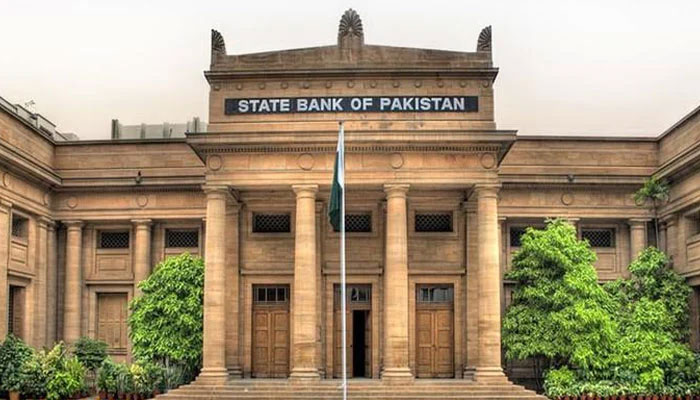SBP payments system review: Mobile, internet banking preferred mode of digital transactions
The use of Raast, Pakistan’s first instant payment system, also increased, the SBP noted
KARACHI: Mobile and internet banking remains the preferred mode of digital transactions for Pakistanis as these two channels account for half of all digital transactions, the central bank said on Wednesday.
According to the State Bank of Pakistan’s (SBP) quarterly payment systems review for the second quarter of the fiscal year 2023-24, there has been a sustained uptake of mobile apps and internet banking, as seen by the rising number of users and transactions through these channels. “Together, these two channels constitute the largest share of 50 percent in total digital transactions. This trend is expected to continue due to increasing adoption of Raast by these channels,” said the SBP. Mobile and internet banking users reached 16 million and 11 million, indicating a quarterly growth rate of 8 percent and 5 percent, respectively.
According to the SBP report, during the quarter that ended on December 31, 2023, the number of banking transactions conducted through mobile apps and the internet increased by 29 percent and 15 percent, respectively, to reach 280 million, valued at Rs11.2 trillion and 57 million, valued at Rs5.4 trillion.
The use of Raast, Pakistan’s first instant payment system, also increased, the SBP noted. In the second quarter of FY24, 107 million transactions totalling more than Rs2 trillion were handled through Raast. This was launched in January 2021 and has processed 343 million transactions so far, totalling more than Rs7 trillion in value. “This aggressive and continued build-up in the growth momentum of Raast shows that it is becoming a game-changer for digitising the payments ecosystem in the country,” the SBP said.
With 2.7 million users registered, electronic money institutions (EMIs) are witnessing an increase in the popularity of their E-wallets, particularly among certain demographics like young people and freelancers. The volume and value of e-wallet transactions increased by 31 percent and 37 percent, respectively. “An encouraging trend is the increasing use of digital payments in e-commerce which grew 13 percent by volume in this quarter. All these trends indicate a growing preference among Pakistanis for digital channels over traditional over-the-counter (OTC) options,” the SBP said.
During the quarter, there was a significant increase in the number of card-based transactions at automated teller machines (ATMs), point of sale (POS) and e-commerce. These transactions were 235 million (10 percent), 65 million (10 percent) and 11 million (13 percent) as a result. Notably, a larger percentage of transactions were made using mobile apps and the internet than through cards.
With 229 million transactions made through ATMs during the quarter compared to 49 million through OTC channels, ATMs remained the favoured method for cash withdrawals by clients. This demonstrates how well Pakistan’s ATM network is working, allowing users to withdraw cash whenever they want without having to visit a bank. Additionally, users of these ATMs can send and receive money, pay bills, make donations and carry out other financial and non-financial operations.
The advent of free Raast and QR-based payment methods for purchases has increased the popularity of online payment methods. Twenty-five commercial banks and microfinance banks currently offer person-to-person (P2P) QR and soon, P2M QR payments will significantly expand the percentage of digital payments in retail payments, according to the SBP.
The settlement of interbank fund transfers, government securities and auxiliary clearing services for large value payments was nevertheless made easier by Pakistan’s real-time interbank settlement mechanism (PRISM) and the real-time gross settlement system (RTGS). With a remarkable availability rate of 99.99 percent, RTGS handled 1.5 million transactions totalling Rs273 trillion throughout the quarter.
-
 Kate Middleton Dashes Through Rain At Windsor Castle
Kate Middleton Dashes Through Rain At Windsor Castle -
 Dave Filoni, Who Oversaw Pedro Pascal's 'The Mandalorian' Named President Of 'Star Wars' Studio Lucasfilm
Dave Filoni, Who Oversaw Pedro Pascal's 'The Mandalorian' Named President Of 'Star Wars' Studio Lucasfilm -
 Is Sean Penn Dating A Guy?
Is Sean Penn Dating A Guy? -
 Sebastian Stan's Godmother Gives Him New Title
Sebastian Stan's Godmother Gives Him New Title -
 Alison Arngrim Reflects On 'Little House On The Prairie' Audition For THIS Reason
Alison Arngrim Reflects On 'Little House On The Prairie' Audition For THIS Reason -
 Spencer Pratt Reflects On Rare Bond With Meryl Streep's Daughter
Spencer Pratt Reflects On Rare Bond With Meryl Streep's Daughter -
 'Stranger Things' Star Gaten Matarazzo Recalls Uncomfortable Situation
'Stranger Things' Star Gaten Matarazzo Recalls Uncomfortable Situation -
 Gaten Matarazzo On Unbreakable Bonds Of 'Stranger Things'
Gaten Matarazzo On Unbreakable Bonds Of 'Stranger Things' -
 Beyonce, Jay-Z's Daughter Blue Ivy Carter's Massive Fortune Taking Shape At 14?
Beyonce, Jay-Z's Daughter Blue Ivy Carter's Massive Fortune Taking Shape At 14? -
 Meghan Markle Fulfills Fan Wish As She Joins Viral 2106 Trend
Meghan Markle Fulfills Fan Wish As She Joins Viral 2106 Trend -
 Selena Gomez Proves Point With New Makeup-free Selfie On Social Media
Selena Gomez Proves Point With New Makeup-free Selfie On Social Media -
 John Mellencamp Shares Heartbreaking Side Effect Of Teddi's Cancer
John Mellencamp Shares Heartbreaking Side Effect Of Teddi's Cancer -
 Kate Middleton 'overjoyed' Over THIS News About Meghan Markle, Prince Harry
Kate Middleton 'overjoyed' Over THIS News About Meghan Markle, Prince Harry -
 'Harry Potter' Star Brendan Gleeson Reluctantly Addresses JK Rowling's Trans Views
'Harry Potter' Star Brendan Gleeson Reluctantly Addresses JK Rowling's Trans Views -
 Priscilla Presley Reveals The Path Elvis Would Have Taken If He Were Still Alive
Priscilla Presley Reveals The Path Elvis Would Have Taken If He Were Still Alive -
 Kianna Underwood's Death Marks Fourth Nickelodeon-related Loss In Weeks, 9th Since 2018
Kianna Underwood's Death Marks Fourth Nickelodeon-related Loss In Weeks, 9th Since 2018




